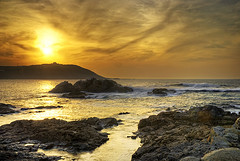 Charles Stross is recounting the long journey to his current position has one of the stars of British science fiction, beginning with his first steps into education during the years of Thatcher:
Charles Stross is recounting the long journey to his current position has one of the stars of British science fiction, beginning with his first steps into education during the years of Thatcher:
I already knew (from an early age — 12 or so) that I wanted to be an SF writer. But there was a fly in the ointment — a fly called Margaret Thatcher. I turned 15 in 1979, the year the conservatives won an election and the Thatcherite revolution swung into action.
Unemployment soared from around one million to over three million in twelve months as the UK experienced the worst industrial recession since the end of the second world war (largely caused by Thatcher’s dramatic decision to cut most of the state-owned industries off at their knees, on the assumption that the workers would find new and more productive jobs sooner rather than later — a misplaced assumption, as it turned out).
I come from a middle-class background; I could expect to go to university, but not to rely indefinitely on parental hand-outs. “You’ll need some kind of way to earn a living while you’re trying to write,” the careers guidance teachers told me.
A familiar story, as this happy university dropout will affirm (except it was Blair instead of Thatcher and the economic collapse only really started after I left).
[image from The Wandering Angel]
 I’ll wager you’ve caught at least a hint of this story already:
I’ll wager you’ve caught at least a hint of this story already: 
 While the needle-in-a-haystack search for life on other planets continues, we still consistently find new lifeforms on Earth when we look in the right places. Our oceans are still a source of biological mystery, but that’s not the only place that extremophile life can be found:
While the needle-in-a-haystack search for life on other planets continues, we still consistently find new lifeforms on Earth when we look in the right places. Our oceans are still a source of biological mystery, but that’s not the only place that extremophile life can be found:  Does the Earth harbour forms of life unrelated to the carbon-based DNA-powered stuff we know about?
Does the Earth harbour forms of life unrelated to the carbon-based DNA-powered stuff we know about?